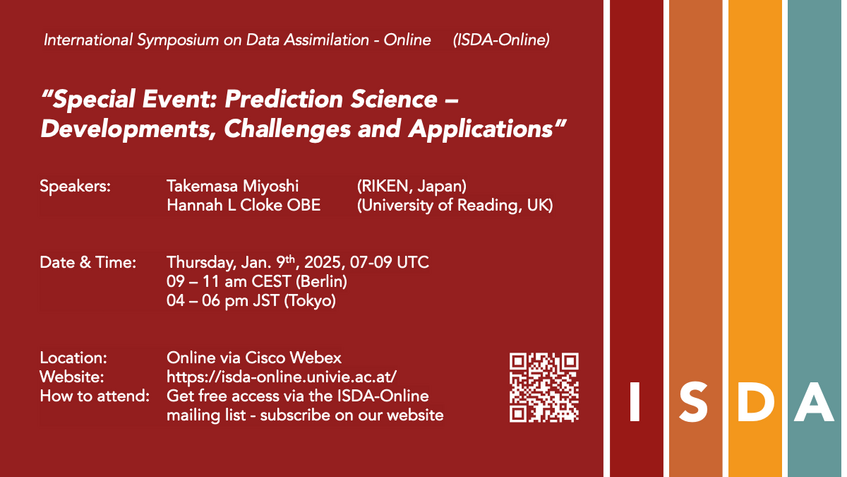Special Event: Prediction Science - Developments, Challenges, and Applications
Thursday, January 09, 2025 from 7-9 UTC
Prediction Science - Developments, Challenges, and Applications
Organisers and Conveners: Javier Amezcua (U. Iberoamericana, Mexico / U. Reading, UK), Philipp Griewank (U. Vienna, Austria), Tobias Necker (ECMWF, Germany), Lars Nerger (AWI, Germany), Nora Schenk (DWD, Germany), James Taylor (RIKEN, Japan)
Invited Speakers:
Takemasa Miyoshi (RIKEN, Japan)
Hannah L Cloke OBE (University of Reading, UK)
We are pleased to announce a special event dedicated to Prediction Science, focusing on advancements, challenges, and applications in Earth system prediction. Esteemed experts will present on topics that cover new methodologies, uncertainty quantification, predictability limits, and the integration of new data sources. This event aims to foster discussions that enhance our understanding and forecasting capabilities of complex environmental systems. We invite all interested participants to join us in exploring the forefront of Earth system prediction to discuss future directions in the field.
Session Recordings (RIKEN website)
Presentations:
- Takemasa Miyoshi
Title: Prediction Science: the fifth science integrating inductive and deductive sciences
Abstract: Data assimilation (DA) brings together the model and data for better estimation, prediction, and control of large-scale, complex systems. DA plays a key role in numerical weather prediction (NWP) and has been extended to other problems such as the ocean, ecosystem, and planetary atmospheres. The model is based on theory and computation and is a process-driven, deductive approach. As for data, recent technological advances enabled Big Data beyond direct human manipulation, so that advanced statistical methods based on computation are effective, leading to rapid advances of data-driven, inductive approaches such as artificial intelligence (AI) and machine learning (ML). Although DA has evolved to be as powerful, the idea of bringing together the inductive and deductive approaches would be more general. We proposed the Prediction Science as the fifth science to develop the general theory and methods for estimation, prediction and control of large-scale, complex systems by integrating the (1) experimental science, (2) theoretical science, (3) computational science and (4) data-centric science, where (1) and (4) are data-driven and (2) and (3) are process-driven. RIKEN started a pioneering project “Prediction for Science” for 5 years in 2020 and expanded to be RIKEN Prediction Science under the TRIP (Transformative Research Innovation Platform of RIKEN platforms) in 2024. This presentation will summarize RIKEN’s activities on Prediction Science. - Hannah L Cloke OBE
Title: Preparing for floods in an uncertain future: forecasting, warning and imagination
Abstract: Every week, somewhere on our planet, people die in a flood. We can now predict many types of floods well before any rain has even fallen, or the storm has even begun to form. We have spent billions of Euros setting up sophisticated flood prediction systems that undertake billions of calculations to predict when and where floodwaters will be. But what is the point of all of this if nobody can understand the danger that they are in, or imagine their homes and lives swept away? The floods in Germany in 2021 and in Valencia in September 2024 showed failures to prevent deaths. But was this a failure of forecasting science, or a failure of imagination?
Time Zones:
07 – 09 UTC
Europe: 07 – 09 am GMT (London) | 08 – 10 am CET (Berlin)
Asia/Australia: 03 – 05 pm CST (Shanghai) | 04 – 06 pm JST (Tokyo) | 06 – 08 pm AEDT (Sydney)
Americas: 11pm – 01 am PST (San Fran.) | 00 – 02 am MST (Denver) | 02 – 04 am EST (New York)
How to attend to ISDA-Online events?
Simply subscribe to the ISDA-Online mailing list

